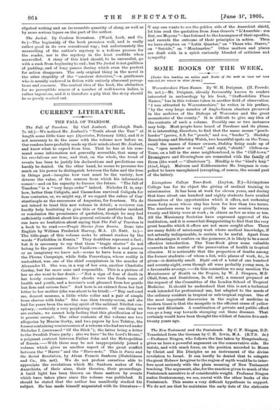THE FALL OF TSARDOM.
length some little time ago (Spectator, February 11th), and it is not necessary to do the same with the volume now before us. Our readers have probably made up their minds about Mr. Joubert, and know what to expect from him. That he has at his com- mand some information not generally accessible, that many of his revelations are true, and that, on the whole, the trend of events has been to justify Isis declarations and predictions can hardly be denied. On the other hand, he seems to presume too much on his power to distinguish between the false and the true in things past—imagine how vast must be the variety, how diverse the value, of the sources from which his information comes I—and on his capacity to foresee the future. "The fall of Tsardom" is a "very large order" indeed. Nicholas II. is, any- how, better than Caligula, and Caesardom survived Caligula for four centuries, or, we might say, if we regard the rulers of Con- stantinople as the successors of Augustus, for fourteen. We do not intend to treat this new volume in detail ; a reviewer can hardly help hesitating to give this or that particular incident or conclusion the prominence of quotation, though he may feel sufficiently confident about his general estimate of the book. He can have no hesitation about saying that The Fall of Tsardom is a book to be read.—Tragic Stories front Russia. Done into English by William Frederick Harvey, M.A. (D. Nutt. is.)— The title-page of this volume seeks to attract readers by the words "Forbidden in Russia." They doubtless represent a fact ; but it is necessary to say that these "tragic stories" do not belong to the present. Sister Vasilieva—whether a real person or an imaginary we know not—seems to have been a nurse in the Plevna Campaign, while Sofia Perovskaya, whose reality is undoubted, was one of the chief conspirators in the murder of Alexander II. She was, in a way of her own, another Charlotte Corday, but far more sane and responsible. This is a picture of her as she went to her death :—" Not a sign of fear of death in her lovely countenance. Her cheeks were the fresh roses of health and youth, and a heroine's soul gleamed from her gentle but firm and serious face." And here is an extract from her last letter to her mother (she was about to be tried) :—" Buy and send me, dearest mamma, a little white collar and a pair of simple loose sleeves with links." She was then twenty-seven, and she had for years been the moving spirit of the militant Nihilist con- spiracy,—certainly a very perplexing creature. Of one thing we are certain ; we cannot help feeling that this glorification of her is pessimi exempli. The other contents of the volume are two allegories by Maxim Gorky, and two papers by Leo Tolstoy, the former containing reminiscences of a veteran who had served under Nicholas I. (surnamed "Of the Stick"), the latter being a letter to the Swedish Peace party ; also we have "In the Lord's House," a poignant contrast between Father John and the Metropolitan of Russia.—With these may be not inappropriately joined a volume which gives us another aspect of the great conflict between the "Haves" and the "Have-nots." This is Paris and the Social Revolution, by Alvan Francis Sanborn (Hutchinson and Co., 16s. net). We do not profess ourselves able to appreciate the revelations which Mr. Sanborn makes of the Anarchists, of their aims, their theories, their proceedings. A lurid light has been thrown on these matters by events which have taken place since the volume was published. It should be stated that the author has manifestly studied his subject. He-has made himself acquainted with its literature—. if any one wants to see the golden side of the Anarchist shield, let him read the quotation from Jean Grave's "L'Anarchie : son But, ses Moyens "—has listened to the harangues of their apostles, and records the outcome of their principles in action. Then we have chapters on "Latin Quarter," on "Those who Starve," on "Suicide," on "Montmartre." Other matters and places are dealt with in a spirit curiously blended of criticism and sympathy.






































 Previous page
Previous page